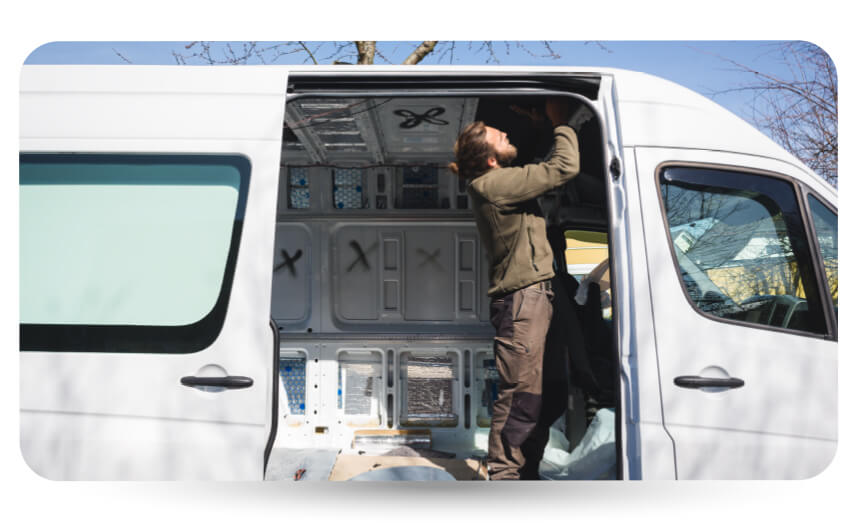Tips on buying a used van for your business
17/10/2023 00:00:00by Mark McKenna17/10/2023 00:00:00Tips on buying a used van for your businessBluedrop Services

For businesses big and small, having a reliable mode of transport can be invaluable. If you're considering purchasing a van, a second-hand van might just be the economical choice you need. However, the process of buying a used van requires careful consideration to ensure you get the best deal.

Buying a used van for your business
The decision to invest in a second-hand van is not one to take lightly. With hundreds of options on the market and each having its own history, it's important to do your research. Before diving into the details, let's establish a few basics:
1. Documentation is key: Firstly, always prioritise vehicles with documented maintenance. A service history, preferably dating back to the original owner, can tell you a lot about its health and reliability. For extra peace of mind, you can pay the DVLA for a vehicle history report. This will provide you with all the information you need about the van's insurance and police records. At the very least, make sure there's proof of consistent and regular maintenance.
2. Listen to your intuition: Secondly, listen to your gut when making decisions. If any element of the sale feels off, whether it's the condition of the van or the behaviour of the seller, you might want to reconsider.
Testing the vehicle and doing a direct inspection are non-negotiable parts of the buying process. Here are some tips to consider when buying a used van for your business:- Examine the van thoroughly for signs of rust, dents or any imperfections that might suggest past accidents or neglect.
- Make sure all tyres are equally inflated and check their tread depth; it should be no less than the 1.6mm legal benchmark.
- Cross-reference the mileage with the van’s apparent age and wear. A mismatch can raise red flags about potential tampering.
- A glance at the engine can reveal a lot. Evaluate its overall condition and check the oil level. If the engine feels warm before starting, that could indicate underlying issues.
- Test all lights for consistency and brightness. Any flickers or unusual behaviour can signal deeper electrical concerns.
- Taking care of the interior is just as important as the exterior. Any excessive wear, tear or damage could suggest a history of misuse or hidden problems.
Assessing insurance costs before investing in a second-hand van
Before buying a used van, it's crucial to understand the potential insurance costs involved. For businesses, these costs can vary significantly based on factors like the van's usage, the amount of goods transported and the area in which you operate.
If you're operating multiple vans, compare fleet van insurance for better coverage and lower rates. By doing your insurance research ahead of time, you ensure that your second-hand van not only meets operational requirements but also aligns with your financial planning.Choosing the right second-hand van for your business needs
Finding the ideal vehicle for your business goes beyond just the price tag – it’s critical to maximising operational efficiency and cost-effectiveness. Here's a helpful guide to make the process a little smoother:
1. Capacity: Determine your typical cargo. Think about both volume and weight. Will you be transporting bulky items, or do you need to handle heavier loads?
2. Entrance and exit points: Depending on the nature of your deliveries or pickups, think about the kind of access you'll need. While rear doors are standard, sliding side doors can be advantageous for certain businesses, especially in tight spaces.
3. Manoeuvrability and size: Your business's operational areas play a key role in this decision. If tight alleyways and crowded city streets are part of your regular routes, a van with a compact design and a good turning radius might be the most appropriate fit.
4. Fuel efficiency: If your business demands long-distance travel or frequent trips, the fuel economy of a van becomes more important. Investing in a second-hand van with high fuel efficiency can lead to significant savings in the long run.
5. Future-proofing: Business growth is a goal for many. When choosing your van, consider its scalability. It's wise to choose a second-hand van that won't quickly become too small or inadequate as your business expands.
6. Resale value: If you're buying a used van, it's also worth considering its potential resale value. Some models retain their value better than others. This can influence your total cost of ownership.
When buying a used van for your business, it's crucial to look at both your current and future needs. Incorporating these factors into your decision-making process will not only ensure that you get value for your money but also that the van seamlessly integrates into your business operations.Return to blog menuWant to find out more about Bluedrop's Fleet Van Insurance?
Call our friendly team now for the right insurance cover - at the best price
+441489780491
Calls recorded for training and quality.



 Privacy and Cookie Policy
Privacy and Cookie Policy